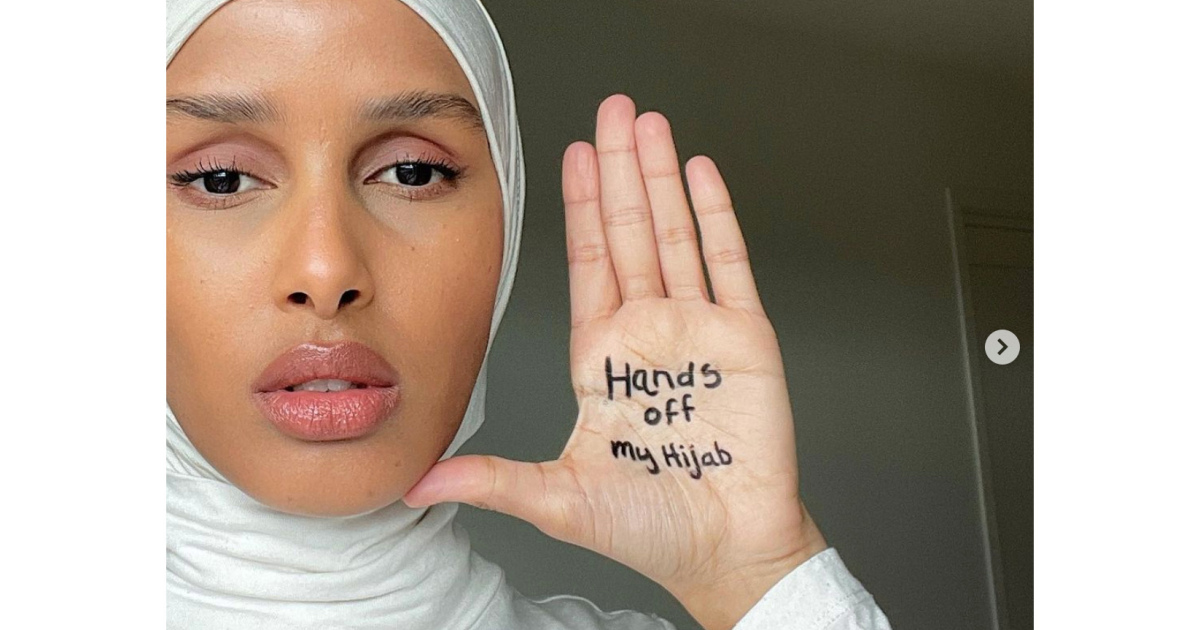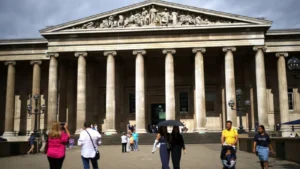
Last month, the French Senate voted in favour of banning girls under 18 from wearing the hijab in public spaces.
It was the latest in a series of legislative moves officially intended to crack down on religious “extremism” in France, which according to critics unfairly target the country’s minority Muslim population.
Somali-Norwegian model Rawdah Mohamed responded with a viral Instagram post criticising the proposed ban with the phrase “Hands off my hijab” written on her hand, saying in the photo caption: “The only antidote of hate crime is activism.”
The ban is unlikely to pass, but the development once again reignited the French debate over the Muslim headscarf.
Soon after, the hashtag #HandsOffMyHijab, as well as the French translation of it #PasToucheAMonHijab, trended on social media, and was shared far and wide by the likes of Olympic fencer Ibtihaj Muhammad and US congresswoman Ilhan Omar.
In an interview with Al Jazeera, Mohamed said she wants to fight “deeply rooted stereotypes” against Muslim women, who she hopes to “unify” in an effort to fight Islamophobia.
Rawdah Mohamed modelling in Paris, France in 2019 [File: Kirstin Sinclair/Getty Images] Al Jazeera: What was your aim with the Hands Off My Hijab post?
Rawdah Mohamed: It was frustrating because I was watching all of this unravel. Not just this [hijab ban] incident, but many other incidents before.
Muslim women are always left out of the discussion, no one was really asking us what we thought. You’re constantly being silenced, and you’re constantly having people speak for you. I just came to a point where I felt: Okay, I have to take this in my own hands and do what I can.
Muslim women tend to be either victimised or made out to be almost like criminals. I wanted to show there are actual women whose lives are being affected by this.
I also did it to unify Muslim women, because it does get lonely when you’re constantly attacked. If you look at the media and what politicians say, and you’re a very young woman trying to find your identity, it will seem as if the whole world is against you. I want young girls to know it is difficult out there, but if we unite we can stand up against this.
France’s 5.7 million-strong minority Muslim population is the largest in Europe [File: Thibault Camus/AP Photo] Al Jazeera: Has the situation worsened for Muslim women in recent years?
Mohamed: I think politicians have discovered a new sort of “escape code”. They know they can get the votes they need by shifting the attention of people against Muslim women. And if it works for one politician, then the others, they follow suit.
The world has become much more hateful towards us in recent years. I think there is a highly dangerous, xenophobic, anti-Muslim feeling that is going around in Europe now.
I also believe it’s because more and more young Muslim women want to have jobs and to partake in society … Others like me are trying to take up the space that we feel like we deserve.
If you grew up in Europe, you always hear that you’re free, and you can become whoever you want. So when you come to a certain age, and you feel like, oh, everyone else gets to have the freedom, but not you, it’s gaslighting.
Al Jazeera: Do you face discrimination in the fashion world?
Mohamed: When I’m going to work at fashion shows, I have to carry an ID when I’m going in. Because they don’t believe that I genuinely have access as a Muslim woman. Sometimes they won’t even let me inside even with an ID. So I have to call my contact, who’s inside the show, and they have to come out to let me in. That has happened to me many times. And one time, I even missed the show because they took so long [to let me in].
The hijab is a headscarf worn by many Muslim women and has been the subject of a decades-long feud in France [File: Geoffroy Van Der Hasselt/AFP] Al Jazeera: What are the positive experiences you have as a model?
Mohamed: In the fashion world everyone appreciates my style, the way I put the garments on, and I’m not just seen as a hijab wearer – everyone just sees me for who I am. And it’s very freeing in that sense.
And then you’ll come out of that little bubble that you have created with your colleagues and the wonderful people who understand you. And then you come out to society where it’s completely different, when people see you as someone who’s oppressed, someone they have to free, completely disregarding the human you are.
Al Jazeera: Do you have hope for the new generation of young Muslim women?
Mohamed: There’s so much resilience and firepower in the young generation, and I’m really glad because everyone is so angry at this [French Senate vote] and they’re doing something about it, creating all this awareness and people are having these difficult conversations where before they might not even have had them.
Being 20 years old and having a discussion with your 50-year-old boss is very difficult, but that is starting to happen. It does give me a lot of hope, seeing the younger generation … fighting to have equality for all.
Editor’s note: Parts of this interview were edited for clarity and brevity.
Rawdah Mohamed is among a growing number of models who wear the hijab, and are being hired by large fashion brands [File: Kirstin Sinclair/Getty Images]






